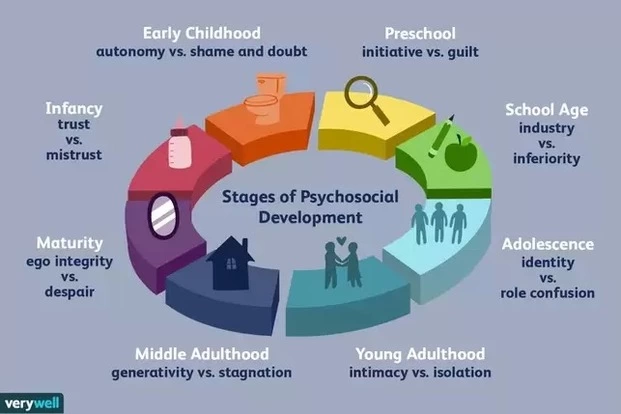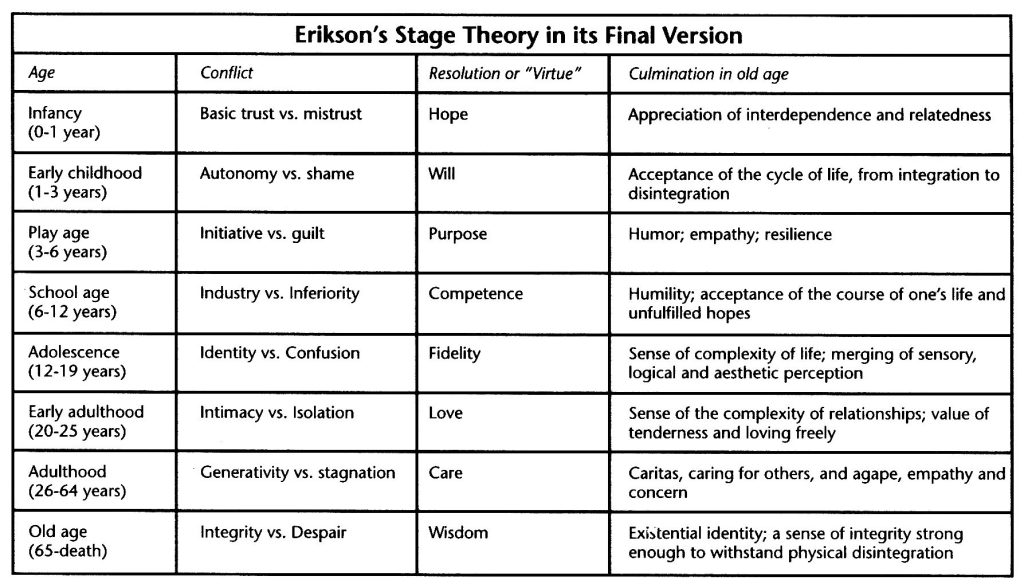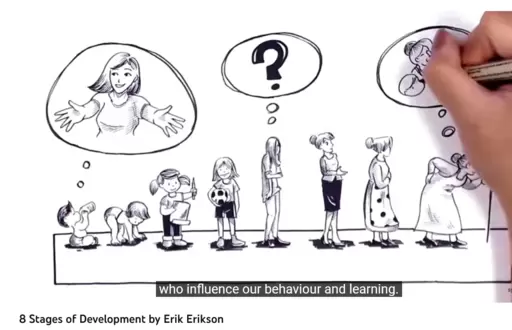ERIKSON’S STAGES OF GROWTH
Erik Erikson was a developmental psychologist who specialized in child psychoanalysis and was best known for his theory of psychosocial development.
According to Erikson, a person passes through eight developmental stages during their lifetimes that build on each other., five of which are experienced during childhood. At each stage a crisis is faced. By resolving the crisis, we develop psychological strengths or character traits that help us become confident and healthy people. A primary element of Erikson’s psychosocial development theory is that we develop through social interaction
Erikson’s theory is still relevant today as it was when developed over 70 years ago. As a parent, Erikson believed you play an important role in your child’s mastery of these challenges. He believed that the first stage trust vs mistrust was the most important period in a person’s life because it shapes one’s view of the world
Erikson’s Theory is important to know because it enables a parent to help a child move past psychological barriers. If parents understand the importance of social stages and development, they will be able to better support their child as they build life-long relationships.


Stage One: Infants
Erikson believed that the essential challenge your child faces from birth to roughly 18 months old is developing a sense of trust versus a sense of mistrust. At this age, your baby relies on you to provide her with the most basic of needs. In order to experience the world as a safe and welcoming place, she needs to know that you are dependable, emotionally available and accepting. Feeding her when she is hungry, holding her close, picking her up when she cries and treating her kindly all teach her that you are there for her.
Stage Two: Early Childhood Years
In the early childhood years, the emerging conflict is autonomy versus shame and doubt. From roughly 18 months to 3 years, Erikson claimed the focus is on self-control as your toddler learns to walk, grasp objects and use the toilet. Your goal is to respect his developing independence. Supporting independence and keeping him safe, however, is a delicate balance. Overly protective or critical behavior sends your child a message of inadequacy that leads to doubt and shame. Yet safety concerns crop up, too. According to Erikson, you should reassure your child when he makes mistakes and gently teach him the right way to do things. Support his growing sense of autonomy by giving him simple choices over what to wear, eat or do.
Stage Three: Preschoolers
From the ages of 3 to 6 years old, your preschooler deals with the stage of initiative versus guilt. With her increased motor skills and growing confidence in interacting with people, she is ready to take control of playtime and social situations. But in her enthusiasm to lead, she can overstep her bounds or do something dangerous. Punishing her initiative can make her feel guilty. Your task is to get her back on course with gentle coaching and by consistently and calmly setting boundaries.
Stage Four: Elementary and Middle School Years
From ages 6 to 12, the most important social event is school. During this time, your child learns a myriad of new academic and social skills. Erikson describes this basic conflict as competence (also called industry) versus inferiority. Your child’s task is to develop a sense of pride in his skills and abilities. Your encouragement and affirmations teach him to enjoy learning, productivity and striving for success. Encourage his best effort, help him when he gets stuck, have patience when he doesn’t learn something quickly and remind him often of how capable you think he is.
Stage Five: Adolescence
The last psychosocial stage of childhood deals with a sense of identity versus role confusion. From the ages of 12 to 18 years, your child answers the question, “Who am I?” According to Erikson, this is the most important conflict your child faces and successfully managing the first four stages helps him navigate this one. As parental control gets pushed back and your child practices being an adult, peer relationships give your child clues to his political, religious, career and gender roles. At this stage, Erikson believed that parents should support and encourage their child’s exploration.

